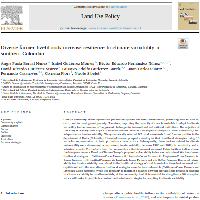Resumen
- Climate variability affects agricultural production systems and rural communities, generating risks to food security and increasing rural poverty. Therefore, improving the capacity of rural households to adapt to climate variability has become one of the greatest challenges for international and national institutions. The objective of this study is to analyze the impact of rural households’ livelihood strategies with regard to their vulnerability and adaptation to climate variability. We systematically selected 162 rural households from 10 municipalities in the department of Huila (Colombia). Households were grouped according to their livelihood strategies, using 13 variables representative of their productive characteristics. Subsequently, three indices related to climate vulnerability were determined: a. exposure (climate variability between 1990 and 2012), b. sensitivity, and c. adaptive capacity. For the latter two, the community capitals framework was used. Using the three indices above, the Intergovernmental Panel on Climate Change’s proposed vulnerability index was determined. We found seven livelihood strategies: i. Cattlemen-Cocoa Farmers, ii. Livestock-Cocoa Farmers, iii. Employees-Cocoa Farmers, iv. Cocoa Farmers, v. Diversified Farmers, vi. Landlords-Cocoa Farmers and vii. Coffee Farmers. Degree of vulnerability to climate variability was related to the livelihood strategy of rural households: those best endowed with capitals and with the most diverse livelihood strategies were the least vulnerable (Cattlemen-Cocoa Farmers and Livestock-Cocoa Farmers). While it is necessary to maintain a balance between capitals in the process of adapting to climate variability in rural households, at the community level it is essential to strengthen political capital, which will make it possible to construct and reinforce strategies for adapting to climate variability.
